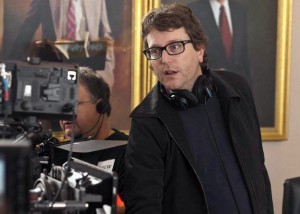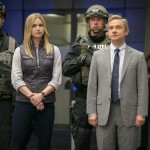
David Dobkin is a risk taker. After directing comedies such as “Wedding Crashers” and “The Change-Up,” he’s moved on to drama with “The Judge,” released on Friday. The film tells the somewhat familiar story of big-city lawyer Hank Palmer (Robert Downey Jr.) who, after returning to his hometown in rural Indiana for his mother’s funeral, is tasked with defending his father, Judge Joseph Palmer (Robert Duvall), against a hit-and-run accusation. The Daily Free Press had the chance to chat with Dobkin via a conference call on Oct. 6 to discuss the inspiration and thoughts behind “The Judge.”
Q: What was the inspiration for “The Judge”?
David Dobkin: I, along the way, somehow turned into a comedy director. But for many years, I wanted to get back to this [drama]. When I went through some personal experiences, with my parents aging and passing away, it really hit me on a personal level. I found myself, at least with my mother, having to parent one of my parents. I felt completely unprepared for that and a little — more than a little bit — overwhelmed. After she passed away a week later, I began to sketch the story of a family whose mother passes away, and the men in the family are sort of broken, like shards of glass being pulled into a vacuum. That became the sketch, and that’s how this story began.
Q: It’s clear that the relationship between Hank and his father is quite dysfunctional. What aspect of their relationship do you think viewers will most relate to?
DD: I think that no matter what your relationship is with your family, no matter how successful you are, we all share regrets. We all share the experience of lost time and leaving home, returning and having to reevaluate who we are, and so much of the movie has to do with that — the feeling of wanting to please your parents. I think there’s a lot of it that’s very universal. The experience of family is a challenging one that we all struggle through, even if it’s not as volatile as what’s portrayed in the movie. What I’ve been experiencing from all the audiences so far is that it’s a very cathartic experience for people. It’s kind of crazy. It’s like a huge therapy session. I come out of these screenings, and some people are sharing stories of their mothers and their fathers and what they’ve lost. It’s been amazing in some way. We’re all going to live with watching our parents get older and die and through their recollection, be able to frame our own lives inside that part of our story, our chapter. It’s a rite-of-passage movie about those kinds of moments.
Q: Robert Downey Jr. and Robert Duvall seem to fall so naturally into the roles of Hank and his aging father. Do you think the actors influenced their characters at all?
DD: The movie was written from the very beginning with Downey in mind. The character was very much him from the beginning. His personality and that kind of character were always inherently there. His father was written as this mountain of a man that was impossible to get through to, to get affection or approval from…and Robert Duvall is an incredibly brave actor and a powerful man. He was the guy we talked about a lot, and it needed to be a man like that. There are a couple of them in Hollywood, [but] very few names that could pull off that role. It’s incredibly difficult to play. You could be unlikeable for a long time in the movie, and he did it in a very sophisticated way. I am a director that believes there is only one person for a role. This one, I think we really got it right.
Q: It seems like Downey really connects with the film as well, and he’s said that the film goes along the lines of classic filmmaking. What’s your take on that?
DD: What happened is that I love those movies, and we wanted to make a movie where it felt like the acting style, the photography and the story itself were out of a classic time. I wanted it to feel as if this movie was once a great American novel or [as] if it was an adaptation of something literary. We were aware of that, and along the way, another kind of color came in…something with a dramatic center but that also has laughs and a full range of emotion.
Q: You’ve said you’ve been inspired by older films like “Taxi Driver.” What’s your favorite film of all time, and how does that relate to “The Judge”?
DD: It’d be a 10-title tie between “Dog Day Afternoon,” “Star Wars,” “Close Encounters of the Third Kind,” “The Godfather” and more. I’m like one of those weird kids that love the popcorn movies of my time. For many years, it was “Apocalypse Now.” You know, I love movies like “Ordinary People” and “Kramer vs. Kramer,” movies that were really sitting in a specific time period, when our society was struggling with certain ideas like divorce and therapy. Could you go to therapy and not be called a basket case? What we did is that we all went to a movie theater and we got to have that dialogue in the privacy of being in a movie theater, but in a group. We learned a little bit more about our lives and didn’t feel so alone. That’s the power of filmmaking and what it can do that no other art form can do. There’s no question that this whole idea of healing our families and trying to return home exist. They are issues in our own lives right now. We wanted to make something that reflected that.
Q: Not only is the story of “The Judge” quite classic, but the way you captured it is as well. The movie was shot entirely on film. Did this present any challenges?
DD: I was kind of lucky because the studios try to push you toward filming digital these days, and it’s getting harder and harder to keep shooting on film. We were hoping to create a version of a movie that goes back to the older movies with a more classic feel. Luckily for me, I had a cinematographer who has won two Academy Awards.
Q: What was it like, working with such an iconic cinematographer?
DD: It was amazing. I’ve never worked with anyone like [Janusz Kaminski]. He’s one of a kind and looks at light differently than anyone I’ve ever worked with. He is just so deeply gifted. There’d be times when I really wanted to shoot something, but I could tell it wasn’t going to be a beautiful image. He’d always find a way to make the lighting [and] make the composition better than it was. He’s a painter, you know? Lighting is painting.
Q: You also worked with an admirable production team. You got Team Downey, Susan and Robert Downey Jr., for the first time ever. What did they bring to the production process?
DD: I knew both of them before the success that they’ve had together since “Iron Man.” As producers, you listen to what the filmmaker is trying to do [and] you support it and you improve it. You protect the filmmaker from the outside forces that are trying to make the creative risks less risky. My experience on this movie is, by a long shot, the best experience I’ve had as a filmmaker. They [the producers] do all of those things on a really high level. They kept all of those [distractions] away from me and Robert. Making a people-oriented movie with movie stars in it…independents don’t do that either. Only this kind of set-up could have shepherded the movie.
Q: Overall, what’s something that you wish for the audience to take away from this film?
DD: I can tell you what’s been happening. I hope people come for two hours, first of all, and I don’t believe in people coming to a movie for two hours and not having a good time. Maybe this is inherent in my “Wedding Crashers” DNA. There’s a lot of that in the movie, but it’s also very thoughtful and makes you think about your home and where you came from. Hopefully, it takes some weight off of [the audience’s] shoulders. We had this really cool screening that we walked out of one night very early on where we talked to people in the audience. We patted ourselves on the back because as we were walking out, there were tissues littering the aisles and we were like, ‘Wow! It did that too!’




